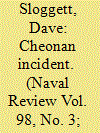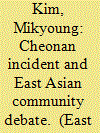| Srl | Item |
| 1 |
ID:
098155


|
|
|
| 2 |
ID:
108382


|
|
|
|
|
| Publication |
2011.
|
| Summary/Abstract |
The East Asian community debates project the region as one integral unit. Rapidly shifting landscapes explain the tension between the old order and emerging hierarchy where North Korea plays a crucial role. This paper analyzes North Korea's place in the East Asian community debates by examining the regional governments' reactions to the Cheonan incident. The responses and circumstances of South Korea, Japan and North Korea to the sunken ship incident demonstrate three dynamics. First, domestic political needs of the regional government supersede normative Community rhetoric. Second, manageability of the North Korean regime will determine the next regional hegemon. And third, the community debates need to include North Korea for viability.
|
|
|
|
|
|
|
|
|
|
|
|
|
|
|
|
| 3 |
ID:
138912


|
|
|
|
|
| Summary/Abstract |
In this article I assess the limits and potential of South Korea’s democracy as revealed by a review of political developments related to the Cheonan incident. I argue that the incident’s aftermath shows that South Korea’s democratic principles and procedures remain vulnerable to pressures generated by national security concerns, although this vulnerability was covered to a limited degree by an open public sphere and active civil society. Korea’s political functioning in terms of republican principles and procedural democracy was seriously tested as imperatives of national security created the “state of exception.” But civil society appropriated new technologies as well as old tactics to generate “public spheres” of deliberation. I suggest that Korean democracy during the Cheonan crisis reflects the resiliency and vulnerability of the “division system” in which South Korea’s politics is embedded.
|
|
|
|
|
|
|
|
|
|
|
|
|
|
|
|
| 4 |
ID:
100622


|
|
|
| 5 |
ID:
138914


|
|
|
|
|
| Summary/Abstract |
In this article, I examine the 2010 sinking of the South Korean naval ship Cheonan to assess the popular theory of “rally-round-theflag,” focusing especially on its domestic mechanisms. What did the South Korean government do to sell its version of the incident to the public? How effective was it? What were its obstacles? In addition, I explore the possibility that the authorities may in fact have limited ability to engage in effective diversionary activity. I conclude that authorities’ efforts were partially successful because of their monopoly of information, control over the press, repression, and institutionalization of memories. Obstacles to their efforts included nongovernmental organizations, independent journalists, and the president’s low popularity.
|
|
|
|
|
|
|
|
|
|
|
|
|
|
|
|
| 6 |
ID:
138915


|
|
|
|
|
| Summary/Abstract |
What changes has the Cheonan incident brought about in the Northeast Asian region? How and to what extent have those changes shifted as time goes by? I find that the Cheonan sinking has played a key role in deepening the ideological chasm in South Korea between conservatives and progressives. It has also become a serious obstacle to the improvement of South Korea–North Korea relations, and has been the catalyst for the emergence of a Cold War–like rivalry between the US–South Korea–Japan and the China–North Korea–Russia blocs. However, relations among neighboring countries in Northeast Asia have shifted over time, including significant improvement in China–Republic of Korea relations and worsening of relations between China and North Korea and South Korea and Japan.
|
|
|
|
|
|
|
|
|
|
|
|
|
|
|
|